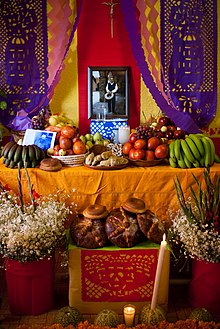Portal:Religion
The Religion Portal
Religion is a range of social-cultural systems, including designated behaviors and practices, morals, beliefs, worldviews, texts, sanctified places, prophecies, ethics, or organizations, that generally relate humanity to supernatural, transcendental, and spiritual elements—although there is no scholarly consensus over what precisely constitutes a religion. Different religions may or may not contain various elements ranging from the divine, sacredness, faith, and a supernatural being or beings. (Full article...)
 Vital article
Vital article
Secularism is the principle of seeking to conduct human affairs based on naturalistic considerations, uninvolved with religion. It is most commonly thought of as the separation of religion from civil affairs and the state and may be broadened to a similar position seeking to remove or to minimize the role of religion in any public sphere. Secularism may encapsulate anti-clericalism, atheism, naturalism, non-sectarianism, neutrality on topics of religion, or antireligion. As a philosophy, secularism seeks to interpret life based on principles derived solely from the material world, without recourse to religion. It shifts the focus from religion towards "temporal" and material concerns. (Full article...)
 Did you know (auto-generated)
Did you know (auto-generated)
- ... that Musa va 'Uj depicts figures from all three Abrahamic religions?
- ... that Gherardo Gambelli, the incoming archbishop of Florence, served as a prison chaplain in Chad for over a decade?
- ... that Catherine de Parthenay, a 16th-century Huguenot leader, was a member of "a highly successful network of information" during the French Wars of Religion?
- ... that the capital of South Ossetia once had more Jews than Ossetians?
- ... that in her 2021 book White Evangelical Racism, professor of religion Anthea Butler called American evangelicalism a pro-Trump, "nationalistic political movement"?
- ... that a religious community is a group of people who practice the same religion, but do not have to live together?
The Tiananmen Square self-immolation incident took place in Tiananmen Square in central Beijing, on the eve of Chinese New Year on 23 January 2001. There is controversy over the incident; Chinese government sources say that five members of Falun Gong, a new religious movement that is banned in mainland China, set themselves on fire in the square. Falun Gong sources disputed the accuracy of these portrayals, and claimed that their teachings explicitly forbid violence or suicide. Some journalists have claimed that the self-immolations were staged. (Full article...)


































































